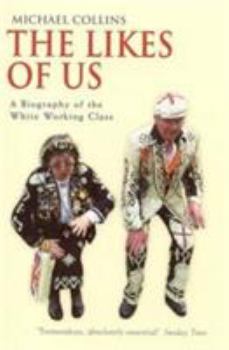The Likes of Us : A Biography of the White Working Class
Select Format
Select Condition 
Book Overview
A personal and impassioned tour through South London's working class history This description may be from another edition of this product.
Format:Paperback
Language:English
ISBN:1862077789
ISBN13:9781862077782
Release Date:January 2005
Publisher:Granta Books
Length:288 Pages
Weight:0.50 lbs.
Dimensions:7.8" x 0.8" x 5.2"
Customer Reviews
2 ratings
Neither an elegy nor a manifesto
Published by Thriftbooks.com User , 19 years ago
Like Michael Collins, I'm another working-white boy who made his way into the professional heartland of the bourgeois-left élite. Like him I get angry at the prejudices of the BBC and the Guardian, not so much towards me, but towards my family, my friends, and the people I went to school with. I enjoyed angrily shouting along with him at the rampaging horde of environmentally-conscious, organic food-eating, inverse racist media trollops who've taken over so much on Inner London. I enjoyed his bitchy putdowns aimed at a class who specialise in the bitchy putdown (for Mr. Collins has a wonderful line in invective). It was a joy to read a book written by and for 'us' for a change. I enjoyed the in depth trolling through the history of his ancestors in Southwark, his accounts, laced with the right amount of working-class sentimentality, of growing up in the 1970s. More seriously, I appreciated the way he deconstructed the media-myth of the working-class white as ill-educated, uncouth and prejudiced. London's working-class whites have been at the sharp end of multi-cultural Britain for 60 yeards and, in most cases, have adapted to it and even thrived in it. He lifts the lid not only on the poverty and squalor of life for poor Londoners from Dickens' era onwards, but also exposes the bizarre social experimentation imposed on the British working-class by the bourgeois left in fields from architecture to education, from the 1950s onwards. And yet, this book could have been so much more. London is not the be all and end all of the world, and the white-working class experience is radically different in other parts of England - from the all-white rust belt towns of places like Durham or South Yorkshire, to racially charged mill-towns like Oldham or Burnley to the Dickensian squalor and transience of the seasonal workers of South Coast resorts like Torquay and Brighton. And all this is even before you look at Scotland, Wales and especially Northern Ireland. While the rootedness and nativism gives Collins' narrative much of its power, it either needed to claim less or do more. The book peters out in the end into a sort of de-emotionalised elegy, and an unrealistic one at that where drugs are somehow the final straw that destroys what generations of alcoholism and violence couldn't. Where next for London's working class whites, whether remaining in the Inner City like Collins' school friends who still live in Walworth, or transplanted out to the ageing suburbs of Bexleyheath or Crayford? Collins makes neither predictions or proposals, and that I feel is a weak point that drags his thesis into the realms of the purposeless whinge. Finally, I think the book needed to pursue a little further the connection between the middle-class missionaries of yesterday and today. Why did the vast improvement in material conditions of working-class whites (and working-class blacks and Asians) in the 1980s provoke such anger among the commentariat? Was it annoyance at th
Useful study of part of the British working class
Published by Thriftbooks.com User , 20 years ago
Collins' family lived in Southwark, and this book surveys this part of the London working class in the 19th and 20th centuries. Southwark is London's oldest borough, after the City and Westminster; it housed the produce, the smells and noise, the leper hospitals, prisons, Bedlam, brothels, bars and theatres that the City and Westminster rejected. Hours were long and lives were short: seven-year olds worked 14 hours a day, until the 1833 Factory Act. Dickens thought that the English were `as hardworked as any people upon whom the sun shines'. He portrays vividly the urban working class culture of work, family, pubs, popular songs, music halls, football, fish and chips, elaborate funerals, good neighbours and street markets that became part of the dominant popular culture in the 1950s. Collins rejects the idea that the working class is backward and racist. "For decades, after all, the urban white working class has largely been educated in multiracial schools, worked in multiracial environments, and lived in multiracial neighbourhoods. Many may not have wanted this, and many more escaped it in the form of `white flight', but many more accepted it." A 1997 Survey showed that only 13% of white Britons said they would have a problem if a relative married an Afro-Caribbean; 32% of Asians, 29% of Jews. So white Britons are the least racist, and the extent of interracial relationships proves the point. Employers don't employ immigrants out of compassion but because they're cheaper. Workers don't oppose mass immigration out of racism but because immigration cuts wages. Liberals and Trotskyists demonised those accused of the murder of Stephen Lawrence as `white trash', a racist phrase. Calling white boys racist or black boys muggers is the same hatred of workers. Playwright David Hare expressed the age-old snobs' caricature of the English when he said, "We associate `Englishness' with everything that is most backward in this country." The working class supports the nation - flying the English flag and having pride in your country does not lead to the BNP.






